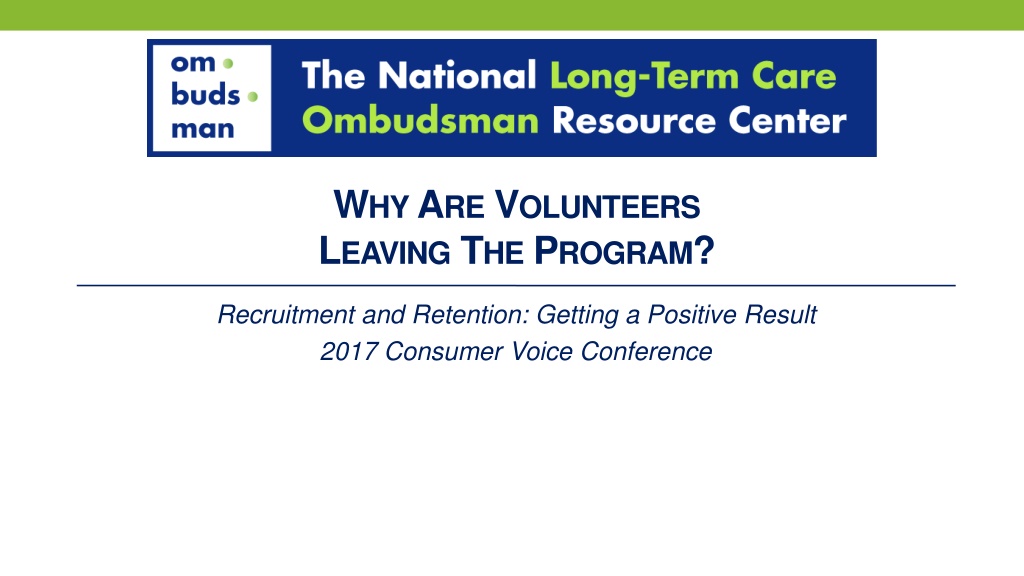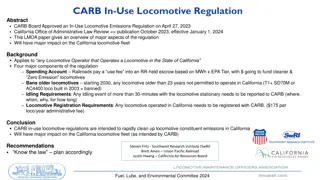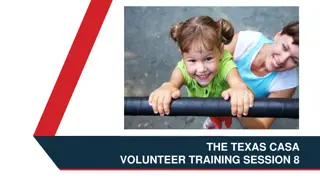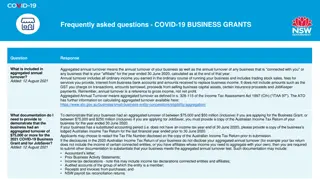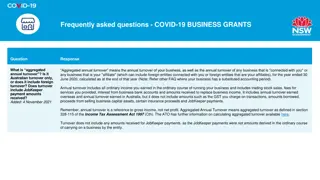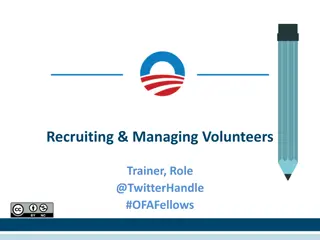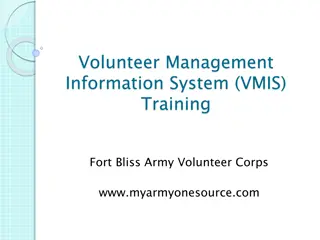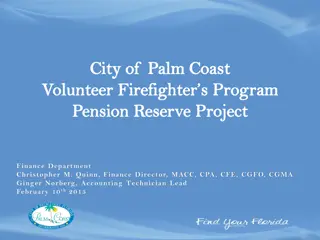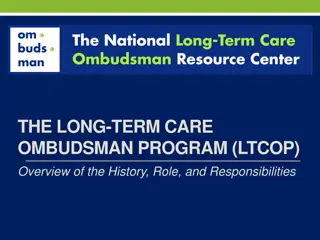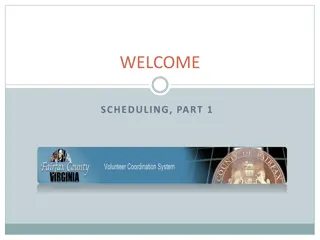Understanding Volunteer Turnover in LTCOP Programs
Explore the reasons behind volunteers leaving LTCOP programs, such as lack of communication, professionalism, and leadership, as well as unmet expectations and inadequate training. Learn from volunteers who quit to improve recruitment, communication, and training processes for better retention and advocacy outcomes through interventions like satisfaction surveys.
Uploaded on Sep 11, 2024 | 0 Views
Download Presentation

Please find below an Image/Link to download the presentation.
The content on the website is provided AS IS for your information and personal use only. It may not be sold, licensed, or shared on other websites without obtaining consent from the author. Download presentation by click this link. If you encounter any issues during the download, it is possible that the publisher has removed the file from their server.
E N D
Presentation Transcript
WHYARE VOLUNTEERS LEAVING THE PROGRAM? Recruitment and Retention: Getting a Positive Result 2017 Consumer Voice Conference
Certified LTCOP Volunteers* 15% decrease in 5 years *certified volunteer: an individual who has completed a training course prescribed by the state ombudsman and is approved by the state ombudsman to participate in the statewide ombudsman program (National Ombudsman Reporting Systems, NORS, Instructions)
Retention Is an outcome, not a task Retention is the end result of a well-organized, welcoming, and meaningful volunteer assignment
Why People Quit Number 5: Lack of communication Number 4: Lack of professionalism Number 3: The feeling that the volunteer is not really making a difference Number 2: No feedback from leadership about how the volunteer is doing And the Number 1 reason: The volunteer leader who doesn't know how to lead Tom McKee is president and owner of www.volunteerpower.com
Why People Quit The organization did not provide clear communications and expectations to the volunteer regarding: A. Role B. Responsibilities C. Boundaries D. Expectations They felt alone and isolated. They did not experience what they thought they would experience. They did not receive the on-going training they needed. They were burnt out. http://christopherscottblog.com/reasons-volunteer-quit/
What Can We Learn from Volunteers Who Quit? And, Why Is This Important? How to improve: Recruitment process Communication Training May keep people volunteering May help volunteer become a better advocate
Interventions Poll volunteers with a satisfaction survey What problems or frustrations have you had in your LTCOP work? What topics for continuing education do you feel would be helpful? When you need help, how does the state or local ombudsman program staff respond? How helpful are monthly (or quarterly) meetings? What would you change about monthly (or quarterly) meetings? Which LTCOP representative role (advocate, complaint investigator, or educator) do you find the most challenging? Why? What are some of the barriers that prevent you from accomplishing the goals of the LTCOP? During monthly (or quarterly) meetings, you are asked to share your experiences. How does this help or not help? Why? What else can be done to provide you with support in your work with this program? http://ltcombudsman.org/uploads/files/library/Compendium-Retention.pdf Page 7
Interventions Use Program Data to Improve Reporting Rate and Volunteer Retention Volunteer Ombudsmen may be discouraged by the amount of reporting Give them the Big Picture. Share the Data and Cases with Successful Outcomes. Explain their Impact. Individual Cases to Systems Advocacy. Encourage Them to Share. Reward Timely, Accurate Reports.
The following resources (and more) are available on the NORC Volunteer Management Page http://ltcombudsman.org/omb_support/volunteer NORC Ombudsman Compendium: Recruitment, Training, Retention http://ltcombudsman.org/library/ombudsman-compendium Long Term Care Volunteer Ombudsman Program Exit Interview Questionnaire http://ltcombudsman.org/uploads/files/support/Exit- Interview-Questionnaire-NY.pdf Long-Term Care Ombudsman Volunteer Exit Interview http://ltcombudsman.org/uploads/files/support/HI-Vol-Exit-Interview.pdf Ombudsman Volunteer Program Exit Interview http://ltcombudsman.org/uploads/files/support/UT-exit-interview.pdf Volunteer Advocate Program Survey for Resigned Volunteers http://ltcombudsman.org/uploads/files/support/MN-Vol-Adv- Survey.pdf Ombudsman Volunteer Survey http://ltcombudsman.org/uploads/files/support/Volunteer-Survey-MO.pdf Join the LTCOP Volunteer Management listserv to share challenges and successes with your peers from across the country, contact cscott@theconsumervoice.org
Contact Information Carol Scott Ombudsman Specialist National Ombudsman Resource Center cscott@theconsumervoice.org
The National Long-Term Care Ombudsman Resource Center (NORC) www.ltcombudsman.org Connect with us: cid:image003.jpg@01CFB310.A36779F0 The National LTC Ombudsman Resource Center cid:image004.jpg@01CFB310.A36779F0 @LTCombudcenter This project was supported, in part, by grant number 90OMRC0001-01-00, from the U.S. Administration for Community Living, Department of Health and Human Services, Washington, D.C. 20201. Grantees undertaking projects under government sponsorship are encouraged to express freely their findings and conclusions. Points of view or opinions do not, therefore, necessarily represent official Administration for Community Living policy.
